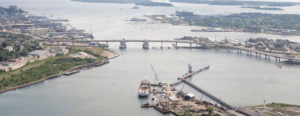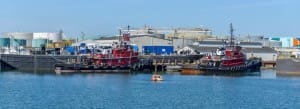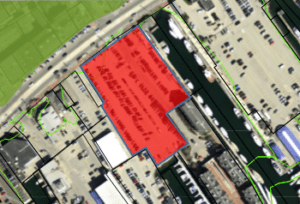Top Story
Date: May 11-16, 2014
Location: Portland and South Portland, Maine
Sponsor:City of Portland and City of South Portland
Subject Area: Long-term Resilience for Coastal Port Communities
Panel Chair: James DeFrancia
BACKGROUND AND PANEL ASSIGNMENT
The Kresge Foundation has awarded ULI an $800,000 grant to support its pursuit of urban design and practices that promote development that is more resilient and adaptable to the impact of climate change.
As part of the Kresge program of work ULI will be conducting advisory service panels to address long-range resilience-related challenges and vulnerabilities to weather and sea-level changes. The hope is that the results of such panels can be applied to other communities with similar vulnerabilities.
The cities of Portland and South Portland Maine were the sponsors for the first ULI Resilience Panel. Portland and South Portland, with a combined population of 92,000 is the largest urban concentration in the state. In addition to the tourism associated with the coast of Maine, the Portland waterfront is the center for the commercial ground fishing industry, lobstering and ferry transportation. It also is the state’s largest container port with a direct connection to Northern European ports. The working waterfront is one of the primary draws for tourists. South Portland has one of the largest trans-shipment points for fuels and crude oil.
The challenge presented to the advisory panel is how do the cities plan for future sea-level rise and extreme storm events while protecting their base industries.
SUMMARY OF RECOMMENDATIONS
The panel outlined the dilemmas facing the two waterfronts and then provided a series of specific strategic recommendations to help the Cities address these dilemmas. These recommendations include:
- Understand the Local Economy.The panel recommended that the cities both undertake a better understanding the local economy and determine how that economy can be better diversified. The panel suggested focusing on sectors other than fishing and tourism including medical, technology, higher education and arts & culture. The panel also recommended that there be a focus on providing resilient infrastructure and that protection of this critical infrastructure could be achieved through incremental changes.
- Understand the Risks. The panel recommended creating a Comprehensive Risk Assessment that studies the broader indirect and macro-economic impacts from increased storm frequency and sea level rise and developing a process to regularly perform a risk assessment for all city-managed infrastructure assets. The panel also recommended integrating the results and conclusions from Risk Assessment into all aspects of the Comprehensive Planning process and using these results to create programs to inform residents and businesses on the importance of floodproofing.
- Planning and Development Strategies. The panel recommended that planning and development strategies be focused on storm surge mitigation, land use protection, street network improvements, parking management, storm water management, historic preservation and utilities improvements. To allow economic activity to continue, the panel also suggested a variety of adaptive strategies like wet floodproofing, dry floodproofing, elevating on fill, elevating on piers, site protection, floating structures and amphibious structures as a means to allow both cities to continue to build and adapt on their waterfronts.
- Examples of Adaptive Construction Techniques. The panel provided the cities with a series of example locations on which the menu of adaptive construction techniques could be provided. Specific consideration was given to the Mill Creek Peninsula where a concentration of critical utilities is located.
- Leadership & Governance. The panel recommended creation of two specific entities: the Climate Risk Data Group and the Resilience Working Group as a means to collect, monitor and evaluate climate change information and how best to implement measures to mitigate for the results of these changes.


